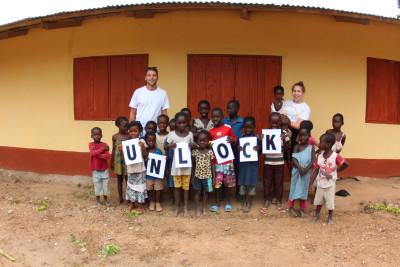
In the four years since the creation of Unlock Foundation, the philanthropic partnership has addressed educational gaps in rural and marginalized African schools by working with teachers, students and community members to ensure that the children get the best primary education possible.
Unlock Foundation was created by Scott Karrel, a 2010 graduate of Boston University’s College of Arts and Sciences, and classmate Michelle Shapiro, a 2010 graduate of the College of Communication. The foundation is the brainchild of Karrel, who went to Namibia after graduating from BU to work as a volunteer teacher at the Divundu Combined School. At the end of his tenure, he began to brainstorm.
“I developed a plan in which we could work together to address some of the barriers the students were facing at the local school,” said Karrel, who also works as the director of the foundation. “In my time working abroad, I had seen how even small efforts to make education a priority had such a big effect on students and community. By working in partnership, we could unlock more possibilities.”
When Karrel returned to the United States, he brought in Shapiro, who now serves as Unlock Foundation’s marketing director.
“We worked together to become a 501(c)(3) nonprofit organization here in the [U.S.], and began working with the teachers at Divundu Combined School to create a plan moving forward,” Karrel said. “We decided that with each project, we would counsel the teachers, students and community to ensure the students had the best primary education possible.”
Unlock Foundation currently works with three schools: the Divundu Combined School and Errki Tauya Junior Secondary School, both in Namibia, and Old Odunase School in Ghana. After Karrel returned from Namibia, the partnership with Old Odunase came together on Facebook. Back in high school, Karrel had volunteered in Ghana and his trip coordinator, Nana Aggrey-Fynn, reached out.
“[Aggrey-Fynn] reached out to Scott on Facebook after seeing him post about Unlock Foundation’s work in Namibia,” Shapiro said. “Nana was helping a new school in Ghana, and wanted to know if Unlock Foundation could lend a hand, and that was the beginning of a great new partnership.”
The Errki Tauya partnership formed through an old friend of Karrel’s from WorldTeach who reached out to Scott after running the Boston Marathon to build a library at a school where he had volunteered.
Part of what makes Unlock Foundation unique, Karrel said, is its approach to helping schools help themselves.
“We have made sure that the schools know that we aren’t just a handout,” he said. “We will only work on projects with them, not for them … What makes us different is our approach, in that we never tell the schools what they need or what they should do. And we don’t duplicate projects at multiple schools because there are so many intricacies with each school and each community that dictate what will be most helpful.”
Overall, Unlock Foundation follows the notion that each school knows best.
“The people who know best what these schools need are the teachers, the students, the parents, the community leaders,” Shapiro said. “So when we go to a school, we meet with all these key stakeholders and listen to their challenges and their priorities, and then work with them to make positive change. The fact that we’re all working together, instead of us coming in and imposing our ideas, is what makes us successful.”
Completing projects at the current three African schools is Unlock’s short-term goal. However, this is not a simple feat.
“[It includes] filling our new library at Errki Tauya … with books and making sure it’s accessible to all, continuing leadership training for the LRC [Learners’ Representative Council] student council at Divundu Combined School in Namibia and getting more desks constructed and getting textbooks for Old Odunase School in Ghana,” Shapiro said.
Shapiro sees the organization meeting those aims within the next five years.
“We want to ensure that by the year 2020, every student at our partner schools can regularly attend class, meet educational standards and, more importantly, the schools and communities can sustain that level of success themselves,” Shapiro said.
Fifty-eight million children worldwide don’t attend school, and 30 million of those are in sub-Saharan Africa, Shapiro said. And while the founders of Unlock Foundation know they cannot reach all of them, they are still optimistic about what the future holds.
“If we can make even one boy or girl’s education better, we have succeeded,” Karrel said. “We hope that by narrowing our focus, we can achieve more … Unlock Foundation was born out of the notion that every person must have a voice, and that by working together, we can do so much more.”
























































































































